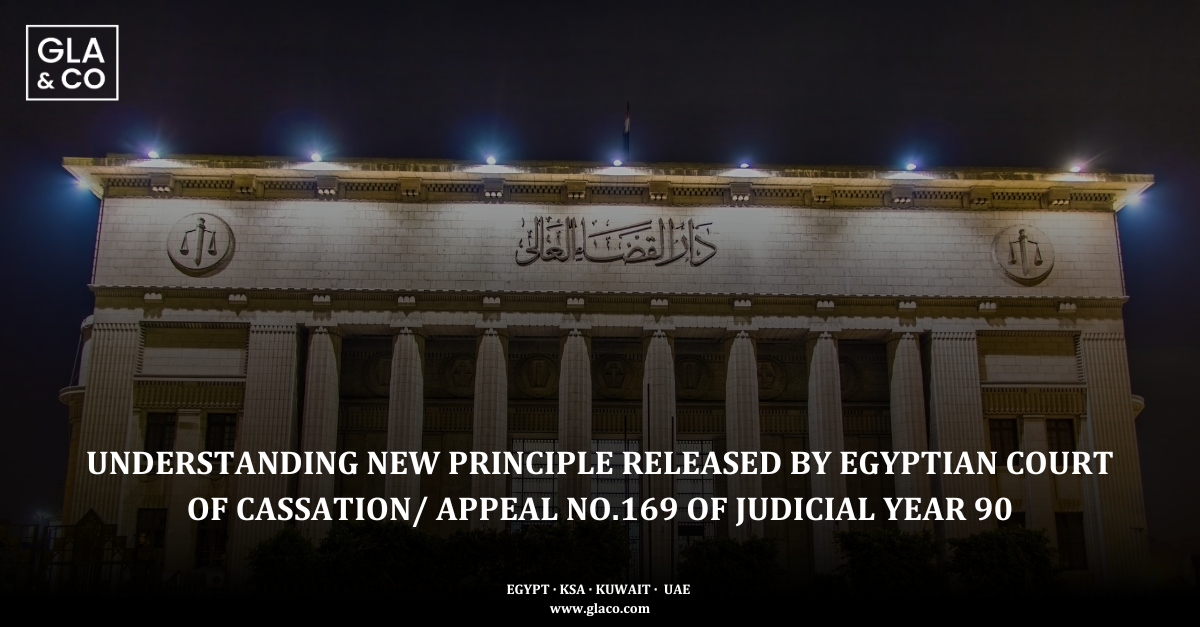
Understanding New principle released by Egyptian Court of Cassation/ Appeal No.169 of Judicial year 90
In the Egyptian legal system, evidence law principles form the basis of fair trials and justice. Central to this system is the rule of burden of proof, which delineates the responsibility of parties to prove or disprove allegations before the court. We tackle in this article a new take of the Egyptian Courts on evidence law principles, specifically before an expert panel or in an expert referral.
Similar to many legal systems worldwide, Egypt operates under an adversarial system where parties present evidence and arguments to support their case. In civil cases, the plaintiff bears the initial burden of proving the allegations against the defendant in accordance with Article 1 of the Egyptian Evidence Law (“Evidence Law”). This involves presenting evidence and establishing a prima facie case to warrant judicial consideration.
In some instances, the burden of proof may shift during the trial. For example, if the defendant raises an affirmative defense, they may bear the burden of proving the elements of that defense.
Facts of the Case
The appeal before the Egyptian Court of Cassation was filed by Al Mokaweloun Al Arab Company (“Appellant”), represented by Mr. Ossman Ahmad Ossman, against the Electricity Company of North Cairo in Egypt (“Company” or “Defendant”). The Appellant filed the case claiming an amount equivalent to 354535.35 EGP.
The case was filed by the appellant before the Court of First Instance for the purposes of ruling with the appointment of an expert to (i) conduct investigation into the damages incurred by the Appellant, (ii) determine the maximum levels of electricity consumption, (iii) determine the measure of the electricity loads (iv) to examine the accounts of the Appellant with the Company and showcase the basis of the quantum conducted along with the value of the tariff on the basis of which he calculations were conducted.
The Court of First Instance as well as the Court of Appeals aligned on the judgement and ruled in disfavor of the Appellant. However, the appealed judgements in accordance with the Egyptian Court of Cassation ruling, deviated from what it adhered to, by considering that the Appellant was the party that have failed to prove its claim.
Key takeaways of the judgement
The judgment established a new legal principle in the Egyptian world of evidentiary rules.
First, the Court of Cassation does refer to the legal principle enshrined under Article 1 of the Evidence Law that stipulates that the burden of proof falls on the one who claims and the oath falls on the one who denies.
Nonetheless, the Court of Cassation, in a departure from several previous precedents, states that this evidence rule is not entirely accurate. The Court further explains that in contracts of mutual obligations, the burden of proof falls on everyone who breached their obligations, regardless of whether it is the plaintiff or the defendant.
In the same vein, the Court of Cassation clarifies that the above principle applies to service contracts, which are contracts under which one party commits to provide or transfer a specific service (i.e., transmission of electricity contracts, contracts related to the supply of water, natural gas, telecommunications services, or banking services), which, according to their nature, require the party providing the service to determine the value of the service, to keep records of all invoices and consumption, and all necessary documents prepared in the event a dispute arises.
The Court finds in its judgment that it is not valid to assign the party recipient of the service to prove a certain fact or allegation that can only be found under the hands of the party providing the services and within the documents in its possession.
The Court of Cassation ruled that even though the burden of proof does fall on the shoulders of the plaintiff or the party that filed the claim, this principle cannot be extended to implement intensive restrictions to the provision of evidence that cannot possibly be under the hands of the plaintiff.
The Court ruled that it is crucial for the opposing party to attend the expert’s sessions and provide any evidence requested. In the event the opposing party refutes or refuses to submit any legal evidence requested by the expert, without legal justification, the court shall have the right to impose legal penalties in accordance with Article 99 of the Civil Procedure Law.
The Court of Cassation finally ruled in favor of the Appellant, overturned the judgment, and referred the dispute to the Court of Appeal.
Conclusion
The recent ruling by the Egyptian Court of Cassation, which permits the shifting of the burden of proof onto defendants in disputes over service contracts, signifies a notable shift in the nation’s legal framework. This decision diverges from established legal principles and sets a precedent with extensive ramifications for litigation concerning service agreements. Consequently, it necessitates a detailed analysis by appointed experts and advocates for a more adaptable methodology in revealing factual clarity, grounded in the evidence presented.
Authors: Youssef Al Amly, Partner and Rana Moustafa, Associate.

